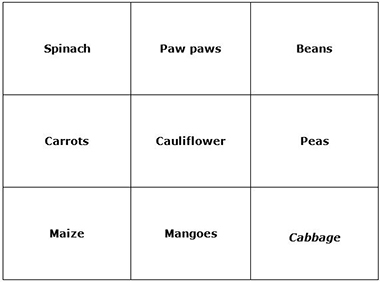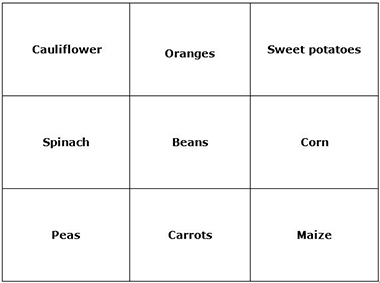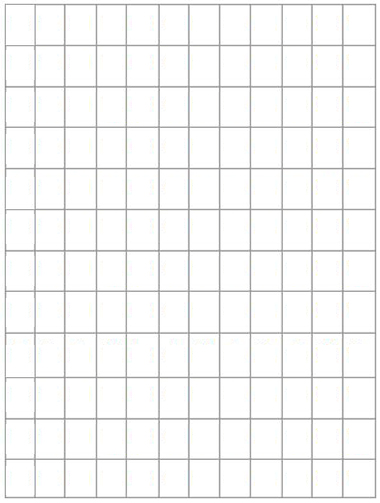Resource 3: Word games
![]() Teacher resource for planning or adapting to use with pupils
Teacher resource for planning or adapting to use with pupils
These games can be played in any language and with any age, provided pupils are moderately competent in literacy skills.
Game 1: Bingo
Read the pupils a story they enjoy and ask them to choose two words they like.
Ask each pupil for their words and write the key words on the chalkboard where everyone can see.
Divide the class into groups of six and ask each group to choose 12 words for their group. These can be different for each group.
Each pupil makes a bingo sheet by drawing a big square divided into nine small squares (see example below).
Tell each pupil to choose any nine words from their list of 12 and copy these into the bingo sheet, one word in each square. Pupils’ sheets will be different, because they can only choose nine out of the 12 words.
One pupil has the master sheet with the 12 words. They call the words out in random order. As a word is called out each pupil who has the word must cross it out from the bingo sheet. The first to cross out all their words shouts ‘Bingo’ and has won.
Let each group play again with each pupil taking a turn at calling out the words.
If you want to use the bingo sheets more than once, ask the pupils to cover the words with stones or counters as the words are called out.
Did the pupils learn new words? How do you know this?
Sample list of words for Bingo:
Beans
Cabbage
Carrots
Cauliflower
Corn
Mangoes
Maize
Oranges
Paw paws
Peas
Spinach
Two examples of bingo cards:


Game 2: Word soup
Make a list of nine words, e.g. parts of the body, rooms in a house, or vegetables. Put this list on the board (next to pictures illustrating the words if you can).
Give each pupil a sheet of squared paper. Tell them to enter the key words into the squared paper, one letter per square. Tell them that words can go from left to right, or top to bottom. Tell pupils to fill the extra squares with any letters of the alphabet. (See example below.)
When every pupil has done this, collect the sheets and mix them up. Now distribute them randomly, and ask pupils to circle all the key words they can find. Each pupil knows there must be nine. The first to finish is the winner.
The pupils can then choose their own subject or area and a word soup from this to give to a friend to play.

Words to find in this word soup:
Bedrooms
Balcony
Sitting room
Staircase
Window
Kitchen
Door
Floor
Ceiling
You can make this more interesting by giving ten words and asking them ‘Which word is NOT included in the soup?’ You can use this game for lots of different words and in different subjects.
A blank template for word soup is below. You can add more squares or make it smaller to make the game harder or easier depending on the age and ability of your pupils.

Make a list of nine words, e.g. parts of the body, rooms in a house, or vegetables. Put this list on the board (next to pictures illustrating the words if you can).
Game 3: Pilolo
In Ghana, there are a lot of children’s folk games.
’Pilolo’ means ‘Time to search for’. The game needs about four players, including the timekeeper and leader.
Before the game starts, the timekeeper has to stand at the finishing place or end point. The leader will also be with the other four to make sure that no one moves from where he or she is supposed to be.
The leader will hide sticks or stones in palm trees, in the sand or in other places. Then the leader will come and announce ’Pilolo’, while the timekeeper starts his or her watch. The other players have to find one of the sticks or stones and run to the end point as quickly as they can. The person who is quickest and reaches the end point first is the winner of the game. The game can be repeated several times to find out the final winner.
This game helps children in Ghana in many ways. It helps them to be physically fit, mentally alert and emotionally sound.
You could adapt this game by hiding word cards in various languages.
Taken from: http://www.gameskidsplay.net/ games/ chasing_games/ pilolo.htm [Tip: hold Ctrl and click a link to open it in a new tab. (Hide tip)] (accessed 03/07/07)
Resource 2: Research on local games in the curriculum



